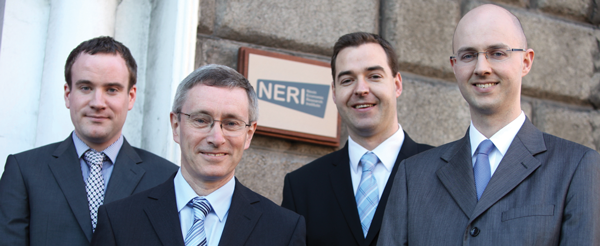The new Nevin Institute think tank
An all-island, trades union-linked think tank has been established, calling for £4.2 billion in stimulus investment for the province.
The Nevin Economic Research Institute was launched on 27 March. Though funded by 24 ICTU-affiliated unions, the institute says that it does not claim to speak on behalf of the trade union movement but seeks to “understand, interpret and explain what is going on in the economies, North and South.” It has offices in Dublin and Belfast and is named after former ICTU General Secretary Dónal Nevin.
Headed by Tom Healy, who previously worked in the South’s Economic and Social Research Institute and the OECD, the four-person institute has one member in Belfast. Formerly employed in fund and investment services by financial services company State Street, Paul Mac Flynn studied economics and public policy, in which he specialised in the economic impacts of UK devolution.
“Only one side of an economic argument, coming from one value set and one motivation was dominating economic discourse,” Mac Flynn tells agendaNi of union leaders’ thinking in initiating the institute. “It was time for another perspective.”
For the Dublin man and his colleagues, the need for counter-cyclical fiscal policy is paramount. Whilst “the last thing economies around the world, particularly in the UK and in Europe, need at the moment is fiscal retrenchment,” Mac Flynn believes a counter-cyclical approach will also be needed “if and when a stimulus plan was implemented and the economy did start to return to growth.”
The institute plans to produce both a quarterly economic observer and economic facts publication on the northern and southern economies. Work on macro-economic and micro-economic models for the South, eventually to be replicated in Northern Ireland, is ongoing.
In its first quarterly economic observer, the think tank proposed a £4.2 billion stimulus plan for Northern Ireland over five years, to counteract austerity that has “disproportionately affected” the province (compared to the rest of the UK) through cuts in public sector employment.
The publication cites the Green New Deal Group proposals for investment in retro-fitting, recommends local government borrowing for investment, and a sub-inflation rate increase in domestic rates with matching funding from the European Investment Bank. It also endorses the redirection of private and public sector pension funds into infrastructure projects.
Mac Flynn says he hopes to publish a more detailed investment plan (based on the above) sometime in the second or third quarter, with commentary on UK funding solutions for infrastructure proposed by government and others.
Another area of work Mac Flynn plans to focus on is the “shortage of economic data for Northern Ireland”, particularly regarding national accounts and taxes (e.g. income tax and corporation tax), which he believes limits the scope for economic debate.
“There are clear policy implications coming from a lack of complete data. You saw it particularly on the issue of the corporation tax,” Mac Flynn says. “When we raised this issue with Sammy Wilson, he said that it presented a problem to him that the current estimates of what the corporation tax take for Northern Ireland is varied hugely from the Treasury sources.” Mac Flynn highlights the fact that the new Economic Strategy is predicated on corporation tax being devolved.
Other data gaps are evident. He states: “We don’t know how much investment in the private sector has been sucked out of Northern Ireland since the recession. It’s hard for us to calculate the impacts on domestic demand because we can’t calculate consumption either.”
Mac Flynn adds: “Without key official facts, the debate is purely hypothetical and I think that has been to the detriment of the policy debate in Northern Ireland.”
The 25 unions funding the institute (¢400,000-¢500,000 per year) include NIPSA, GMB and Unite. It is independent of Congress and individual unions. David Begg, the General Secretary of ICTU, is chair of the institute’s governing council.






